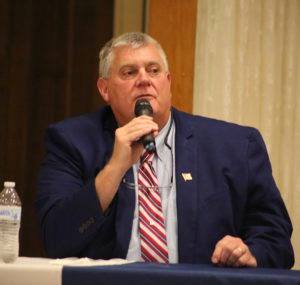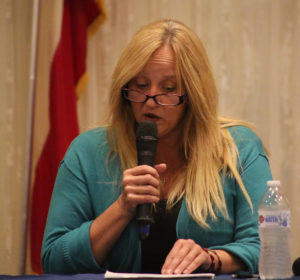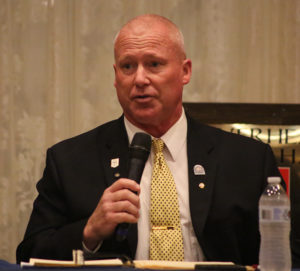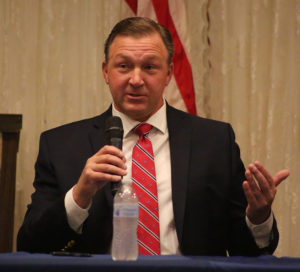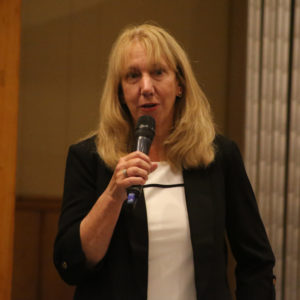Five candidates vying for Town Board debate EPCAL, downtown and more

Podcast brought to you by:
Unlike the contentious debate between the candidates for Riverhead Town supervisor, last Wednesday’s debate among the five candidates vying for two available Town Council seats was relatively peaceful and all of the candidates got along with each other.
The field includes two Republican candidates, incumbent Tim Hubbard and challenger Frank Beyrodt, along with Democrats Diane Tucci and Pat Snyder and Libertarian candidate William Van Helmond. The Republicans also have backing from the Conservative party, while the Democrats are backed by both the Independence and Working Families parties.
Following are excerpts from each candidate’s opening statement, followed by a recount of the debate on some of the bigger issues discussed:
“The reason I think I’m a good candidate for the town is past experience,” Mr. Hubbard, a retired police detective, said. “I was a member of the Eastern Suffolk BOCES advisory board. I was a member of the board of directors of the Riverhead Police Benevolent Association, I was named Educator of the Year by the News-Review and I was elected to the Riverhead school board. All of these put together helped me work with budgets, and the budget in a town this size is a good size budget.”
Mr. Hubbard said he was born and raised in Riverhead and knows the town.
“Plus,” he added, “I have to say that in my first four years on the Town Board, I stand very strong on my record.”
Ms. Tucci, making her first run for Town Board, said she’s a fourth-generation Riverhead resident and “grew up working on my grandparents’ farm in Baiting Hollow.”
She has worked as director of marketing for the Suffolk Theater and has been executive director of both the Riverhead Business Improvement District and the Riverhead Chamber of Commerce, doing both jobs simultaneously for a time. She also owns a marketing business in downtown Riverhead.
She has worked to “spearhead” community events like Alive on 25, the Halloween Fest, the Cardboard Boat Race and Art in the Park.
“I’m known as a person who gets things done,” Ms. Tucci said. “As a Town Board member, I will continue the hard work I have already been doing and take it to the next level.”
Mr. Van Helmond is president of the Greater Jamesport Civic Association and a member of EPCAL Watch. As president of the civic association, he is often the voice of the community, such as when it opposed a town plan to allow live music and alcohol at South Jamesport Beach. He said he’s also served on the board of directors of Vail-Leavitt Music Hall and assisted in naming South Jamesport Avenue after NYPD Det. Brian Simonsen, a Jamesport native killed in the line of duty in Queens.
“I’ve got to feel that as a reformer, I tend to work with the people I’m surrounded by and I try to bring unity and create respect in every organization I’ve been in,” he said.
Mr. Beyrodt is an owner of Delea Sod Farms, which has been in business for 91 years.
“We have to work within budgets, which is the way businesses are successful, and we’ve been here for 91 years, so we’ve been doing something right,” he said.
A former president and longtime member of the Long Island Farm Bureau, Mr. Beyrodt also is on the board of directors of Island Harvest, which provides food to needy people.
“I’ve been on committees and I know how to gain consensus,” he said.
Ms. Snyder retired last year as executive director of East End Arts in Riverhead. Before that, she was director of the arts organization’s school, where she said she increased enrollment from 45 students to more than 1,000.
Ms. Snyder said she created programs like the annual street painting festival in Riverhead and the annual Winterfest cultural program at local wineries during the traditional off-season.
Being EEA’s executive director, Ms. Snyder said, “is where I discovered the power of arts to be a community builder and economic driver.”
EPCAL
Republicans Mr. Hubbard and Mr. Beyrodt both support the potential sale of 1,643 acres of town-owned land at EPCAL to Calverton Aviation & Technology for $40 million, although both also said they support removing approximately 1,000 acres that were not part of the original agreement from the deal.
Both noted that once the deal is complete, the town will immediately receive over $4 million in property taxes, since the land has been off the tax rolls for many years. Both also cited a recent presentation by three companies that said they were interested in coming to EPCAL should the CAT sale be finalized.
“EPCAL? Absolutely yes,” Mr. Hubbard said. “I’m extremely excited.”
“Jobs, jobs, jobs,” Mr. Beyrodt said. “That’s what we need here, and if they can deliver on that, I’m really optimistic about this deal.”
Ms. Tucci said “there’s a lot of questions to be answered” about the proposal.
“Whether I support the deal depends on whether they can live up to the promises of what they say they’re going bring here,” she said.
She also opposes including the additional 1,000 acres in the sale to CAT.
CAT has said it will include a covenant in the contract saying it will not develop that acreage, but it also says it will not do that until the sale is complete.
“It’s a complicated situation,” Ms. Tucci said. “We need the jobs and we need the revenue to add to our tax base.”
“As far as I’m concerned, hope is not a plan, and that’s what I keep hearing,” Ms. Snyder said. “We can’t just hope they’re going to do what they say they’re going to do.”
She said the town needs to hold onto the 1,000 acres.
“That’s our land,” Ms. Snyder said.
Mr. Van Helmond said: “The question is, what is it, and why aren’t they being transparent about it? They haven’t really released much information on the businesses they’re looking to bring in.”
CAT has said it’s difficult to identify tenants for the property because they don’t yet own the land.
Mr. Van Helmond also opposes the sale of the additional 1,000 acres — as well as the low cost-per-acre for the proposed sale.
Downtown
The Town Board recently approved plans to update the town’s master plan for the first time since 2003, and to commission a “pattern book” for the downtown area.
Mr. Beyrodt said that, as an investor and business person, “what you want most in the government that you’re investing in is confidence in knowing that the rules will not be changed on you when you invest your money.”
Some property owners say they bought land because of the prior zoning.
Ms. Snyder said one of the things she’s heard most on the campaign trail is complaints about the five-story apartment building already going up.
“It’s in a place it doesn’t belong,” she said.
Mr. Van Helmond also felt the 116-unit Riverview Lofts apartments are “way out of character.”
Mr. Hubbard, who voted against the pattern book, said the apartments are needed “to create a vibrant downtown,” but he feels there should be more market rate units, as most of the apartments under construction or already built are affordable rentals.
“Market rate people have cash in their pocket so they can go downtown and support the businesses and restaurants,” he said. “That’s what we need. We don’t need any more affordable housing.”
Ms. Tucci agreed with Mr. Hubbard on that issue, saying the town currently has 80 percent affordables and 20 percent market rate apartments. She said it should be the other way around. She said studies have been done that show it’s more important to have more market rate apartments than affordable ones.
Unlike Mr. Hubbard, however, she supports the downtown pattern book.
“My idea of the pattern book is what it’s going to do through input from the community,” she said.
“The book will show what downtown could look like in different forces of buildouts,” Ms. Tucci said. “But more importantly, with the community input, is that it looks like what the community wants it to look like.”
Code enforcement
All five candidates agreed that illegal and overcrowded housing is a major problem, but differed slightly on what to do about it.
Mr. Hubbard proposed changes to the town budget to add two code enforcement officers, along with a part-time paralegal for the town attorney’s office and a part-time clerk for the code enforcement department — all so the town can take code violators to state Supreme Court, which can impose steeper fines than the town Justice Court.
Mr. Hubbard also proposes banning cars parked in front yards and reducing town rental permits from two years to one.
“Every year, when you do a rental permit, you have to be inspected,” he said.
“This will give us a better idea of who’s living in the house,” he said. “It also will give us a better idea of how many people are living in the house, and we also need to require the names of the people who are living in the house. This information, together with working with the school district, which we have to do, is going to help us crack down on this.”
Ms. Tucci said the town can’t put any pressure on the school district for information about who is attending town schools. The town, she said, is only responsible for code enforcement.
Ms. Snyder said the town needs to take some of the cases to state Supreme Court, because many of the violations are safety issues.
Mr. Van Helmond said the town should form an advisory committee to which people who know where overcrowded housing is can report that information.
Mr. Beyrodt supported Mr. Hubbard’s proposals.
“Remember, government’s sole purpose is the safety and welfare of the community,” he said.
Latino population growth
Mr. Hubbard said that Riverhead is not a “sanctuary city,” as a website claimed a few years ago, but added that the designation has “brought droves and droves of people to this town.”
He said Riverhead “has schools that are bursting at the seams,” and that the school district is one of the few in Suffolk County where enrollment increases every year.
“Immigration has to be handled on the federal level,” he said. “There’s not much we can do.”
Ms. Tucci agreed, saying, “I don’t really want to touch immigration issues because that comes from the federal level.”
“I don’t want this to become an indictment of the Hispanic community,” Mr. Beyrodt said. “And it seems that, somehow, in certain parts of our community, it has. I’d like everybody to remember where your family came from. Probably not here.”
He said the first-generation immigrants were probably in some sort of inadequate housing to start.
“Many of these people are working long days and they’re hard-working and they’re good, honest, church-going, God-loving people that just want to make a living and they just happen to be at the bottom of the totem pole right now. Just like the Italians and the Jewish and everybody else that came before us, they came for the dream and it’s government’s role to make sure they are [integrated] into the community.”
A group that had been loudly clapping after Republican candidates spoke was silent after Mr. Beyrodt spoke.
Ms. Snyder and Mr. Van Helmond both said immigration is a federal issue.




